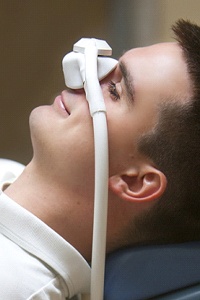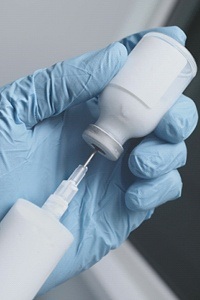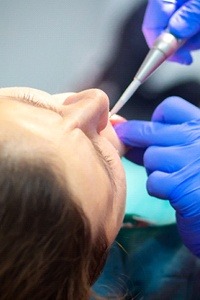Sedation Dentistry – Prosper, TX
Offering a Calmer & Stress-Free Dental Experience

Do you feel anxious when preparing for an upcoming dental procedure? Did you have a bad experience in the past or often feel discomfort during your appointments? yDon’t let your fear get the best of you. Most importantly, don’t let your dental anxiety keep you from getting the care you need to maintain optimal oral health. At Texas Dental Surgery, we want all our patients to feel comfortable and at ease while receiving the quality dental care they deserve, which is why we offer two forms of sedation dentistry. Nitrous oxide sedation and IV dental sedation are safe and effective solutions that makes it possible for our team to provide the treatment or procedure you need while ensuring you remain completely calm and comfortable during your visit. To find out if you are eligible, contact us today.
Why Choose Texas Dental Surgery for Sedation Dentistry?
- Highly-qualified dental experts to administer sedation
- Reliable and safe solutions that you can count ony
- Enjoy a comfortable and relaxing dental appointment without fear or pain
Nitrous Oxide Sedation

Nitrous oxide, also known as laughing gas, is administered to patients who experience mild dental anxiety or who are preparing for a minor treatment or procedure. The odorless gas works within minutes to help you relax while remaining conscious and able to respond to any commands given by our dental team.
How Does Nitrous Oxide Sedation Work?

The process of receiving nitrous oxide sedation is quite simple. When you arrive, one of our doctors will provide you with a nasal mask that you will wear throughout your visit. Once the gas is turned on, you will quickly begin to feel calmer and as if you are floating. After a few minutes of allowing the sedation to take effect, our team will begin the treatment or procedure.
What makes nitrous oxide such a popular and common method of sedation is that it offers no lasting drowsiness and wears off quickly after it has been turned off. There’s also no need for an escort to and from your appointment.
Who Is a Good Candidate for Nitrous Oxide Sedation?

If you have any of the following, you are likely an ideal candidate for nitrous oxide sedation:
- A mild form of dental anxiety
- A fear of needles
- Difficulty being able to control your movement or sit still
- Past dental experiences that proved traumatic
- Tooth sensitivity
- Difficulty with numbing agents
However, just because you qualify based on the reasons listed above, if you are experiencing any of the following, we may suggest holding off or providing an alternative treatment method that does not require sedation:
- If you are pregnant
- If you are currently battling sinus congestion
- If you take certain medications
- If you have respiratory disease
Preparing for Your Appointment with Nitrous Oxide Sedation

Before your appointment where you will be receiving nitrous oxide, it is suggested that you refrain from eating at least two hours before your procedure. The reason for this is that should you have a full stomach, you might experience nausea afterward.
It is also important that you inform us of any respiratory issues you may be experiencing, as this can make it more difficult to breathe through your nose, thus, limiting the effectiveness of sedation.
The last thing you should remember to do is discuss your medication list and previous medical history with our dental team, as this will give us better insight into whether you should receive sedation or not.
Nitrous Oxide Sedation Aftercare

One of the great benefits of nitrous oxide is that the effects do not linger for a long period of time. Instead, they wear off quite quickly. After the gas is turned off, you will need to continue receiving oxygen for at least five minutes to ensure you do not develop a headache. Also, try to avoid eating anything heavy for at least three hours after your procedure.
You should be free to go about your daily responsibilities after you are cleared by one of our team members.
IV Dental Sedation

For patients with extreme dental anxiety or who are preparing for a complex dental procedure, IV sedation is one of the safest, most effective ways to calm nerves and keep patients relaxed. More and more dentists are using this type of sedation to help individuals who may put off caring for their oral health for fear of going to the dentist.
IV Sedation is administered into the bloodstream via a small injection in your hand or arm. This method is used most often on patients with extreme dental anxiety or who are undergoing extensive, complex dental procedures. Offering complete relaxation mentally and physically, it can be beneficial for patients who suffer from a sensitive gag reflex, have difficulty sitting still, or who need multiple procedures completed in one appointment.
How IV Sedation Works

When you arrive for your procedure, a small needle is used to insert a tube into the vein either on the top of your hand or in your arm. The sedation solution will flow directly into your bloodstream, and the IV will remain in your vein throughout the duration of your visit. While under sedation, you can expect our team to closely monitor your oxygen and pulse to ensure you do not have a negative reaction or issue with the sedation.
Patients who have IV sedation can expect to feel nothing from the procedure, nor will they remember much, if anything, from the visit.
Who Is a Good Candidate for IV Sedation?

Although a needle is used to administer the IV, this type of sedation is ideal for individuals who have a natural fear of needles and going to the dentist. If you’re concerned about the needle used to place the tube in your vein, we can apply a topical cream to numb the area prior to inserting the tube.
IV sedation is also great if you:
- Have tried other forms of sedation and none have worked effectively
- Are having multiple procedures at one time
- Are in good overall health
- Have severe dental anxiety
Preparing for Your Appointment with IV Sedation

Prior to your dental visit, it is recommended that you not eat or drink anything 8 hours before your procedure. You’ll also need to make sure someone is available to escort you to and from your dentist’s appointment, as it does take time for the effects to fully wear off.
It might also be necessary to stop taking certain medications before receiving IV sedation. All of these instructions will be provided to you when you schedule your procedure.
IV Dental Sedation Aftercare

Once the procedure is complete, your sedation dentist will remove the IV from your hand or arm. You can expect to feel drowsy with the medication taking anywhere from 24-48 hours to fully wear off. You may also have dry mouth as a result of your mouth remaining open throughout your procedure. It’s also likely that dry mouth will occur if you required any gauze to be placed into your mouth after surgery.
Although not all patients are the same and some will experience certain side effects that others do not, nausea, vomiting, headaches, and amnesia are all possible after receiving IV sedation.
IV Sedation FAQs
Will Sedation Dentistry Put Me to Sleep?
Dental sedation uses different ingredients than general anesthesia (which is designed to produce a state of total unawareness). You might drift off to sleep while you are under the influence of dental sedation, but you will not be totally unconscious. That is to say, you should remain alert enough to respond to directions and questions from our dental team. If you do doze off, it will be easy for us to awaken you with a gentle shake.
What Procedures Is Sedation Dentistry Used for?
Nitrous oxide is such a light and versatile sedation option that it can be used for relaxation during nearly any type of dental appointment. This includes everything from dental crowns to routine cleanings. However, we are more exclusive in our use of IV sedation. Typically, we will only recommend IV sedation for extensive procedures. Prior to your oral surgery, we will evaluate your medical history, discuss your needs, and determine the type of sedation that is the best fit for your unique circumstances.
Are There Any Serious Risks Associated with Dental Sedation?
The risks associated with dental sedation are minimal. Prior to approving you for it, we will take a thorough medical history to assess the risk that you will suffer serious side effects. If you are in a high-risk group, we may explore different ways of making you comfortable. During your procedure, we’ll keep a close eye on your breathing and other vital statistics. After you go home, be sure to give us a call if you have any concerns about how the lingering sedation is affecting you. Your safety is always our top priority!
What Type of Medication Is Used for IV Sedation?
The most common class of medications used in IV sedation are benzodiazepines. These drugs work by temporarily increasing the effects of a brain chemical called gamma amino butyric acid (GABA). GABA reduces the processes in the brain that are responsible for anxiety and arousal. Hence, you should enjoy a state of deep relaxation while you are being sedated via benzodiazepines.

